|
|
|
|
 CHAPTER 27
CHAPTER 27Mosiah forbids persectution and enjoins equality—Alma the younger and the four sons of Mosiah seek to destroy the Church—An angel appears and commands them to cease their evil course—Alma is struck dumb—All mankind must be born again to gain salvation—Alma and the sons of Mosiah declare glad tidings. [Probably between 100 and 92 B.C.] |
||
|
1 AND now it came to pass that the
persecutions which were inflicted on the church by the unbelievers became so
great that the church began to murmur, and complain to their leaders
concerning the matter; and they did complain to Alma. And Alma laid the case
before their king, Mosiah. And Mosiah aconsulted
with his priestsa.
2 And it came to pass that king Mosiah sent a proclamation throughout the land round about that there should not any unbeliever apersecute any of those who belonged to the church of God.
|
1a Mosiah consulted with his priests This is a most interesting time which the abridged record does not clarify the exact circumstance of. King Mosiah was a prophet and seer as well as being king. He had a 'church' which offered baptism and the preaching of the word of God and Christ as well as the keeping the Law of Moses in respect to the temple ordinances of sacrifice. Alma had received power and authortiy of God to establish a Church of God in conjunction with his people. The exact nature of the 'marriage' between the two would be most interesting to understand. King Mosiah was still God's Prophet and Seer, the keeper of the records of God as he did proceed to translate the 24 plates of gold of the Jaredites. And he would not relinquish that position of Seer until he would give up the care of the records and sacred things unto the hands of Alma the younger. King Mosiah had given Alma Sr. the authoritative permission to establish the Church of God in the lant of Zarahemla with Alma being it head, its president, its prophet and leader. When a question of living the Laws of God came to Alma he referred them to Mosiah who seeing them as pertaining to the church referred them right back to Alma who subsequently received a revelation from God concerning the order of excommunication and repentance within the Chruch. But the exact lines between Church and State and whether there was but one Church or two manners of worship many not have been conpletely worked out as here it states that King Mosiah did consult with 'his priests' concerning making a proclamation to all the people of the land concerning the matter of 'inter-religious' persecution. Now logic would seem to be that a person could worship and sacrifice at the temple according to the Law of Moses without belonging to the Church of God though certainly those priests of the temple sacrifices and ordinances of the Law of Moses were being carried out by descendants of Joseph and not of Levi in the Nephite world. Nephi had long past established that they did keep the Law of Moses for Christ had not yet come, but it was a matter of performing the motions for they did know of and did exercise the baptism of Christ unto his atonement among them. This in itself yields a consideration of 'religion' by degrees. That King Mosiah was a member of Alma's Chruch of God is a presumption and not an established fact from the record. That he did continue to exercise a degree of religious authority appart from the Church proper seems evident in his keeping of the records and the use of the Urim and Thummin and translating the Jaredite record as well as here seeming to retain his own set of authorized 'priests'. |
1a
TG
Counsel 2a TG Persecution
|
|
3 And there was a strict command throughout all the churches that
there should be no apersecutions among them, that there
should be an bequality among all men;
4 That they should let no pride nor haughtiness disturb their apeace; that every man should besteem his cneighbor as himself, dlaboring with their own hands for their support. 5 Yea, and all their priests and teachers ashould blabor with their own hands for their support, in all cases save it were in sickness, or in much want; and doing these things, they did abound in the cgrace of God.
|
3a
TG
Malice b Mosiah 23:7; Mosiah 29:32; Alma 30:11 4a TG Peace b TG Love c TG Neighbor d TG Industry; TG Labor 5a Mosiah 18:24, 26; Alma 1:3, 26 b TG Work, Value of c TG Grace
|
|
|
6 And there began to be much peace again in the land; and the
people began to be very numerous, and began to scatter abroad upon the face
of the earth, yea, on the north and on the south, on the east and on the
westa, building large cities
and villages in all quarters of the
landb.
7 And the Lord did avisit them and bprosper them, and they became a large and wealthy people.
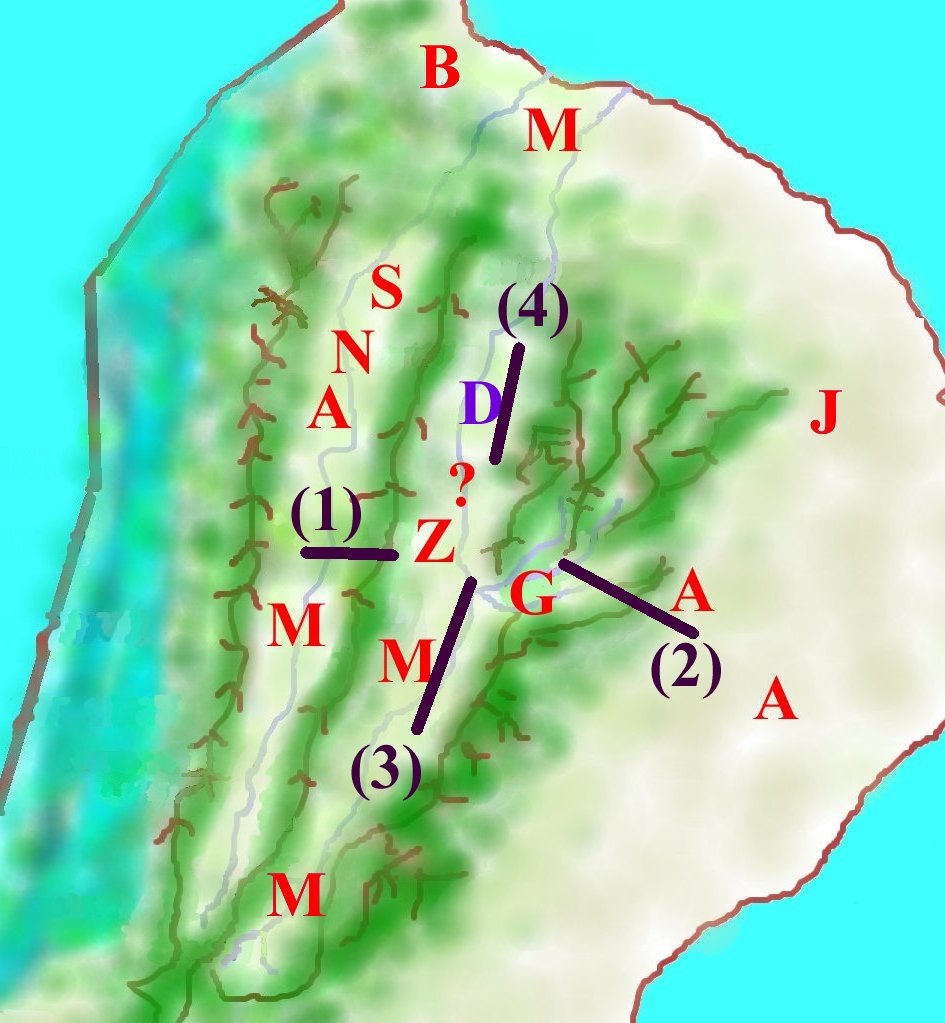 (2) Eastern Settlements: Gideon-considered to be those righteous Nephites of the people of Limhi who were primarily the followers of Gideon who had stood up to fight aginst wicked King Noah (Mosiah 19:2-8; Alma 2:20; Alma 6:7). They settled in the east valley which brakes off of the Sidon Valley through the eastern mountain range. Antionum-that settlement under the name of Zoram or the Zoramites (Alma 31:3). Aaron & Jershon-considered to be the land east to which Alma was headed after being expelled from the provincial land of Ammonihah which included Noah and Sidom (Alma 8:13-14), that concluding his mission to the lands west of Zarahemla, Alma was heading for the lands east of Zarahemla and Gideon, Aaron being the provincial capital of that land of Jershon east (Alma 50:14). These lands of the east were greatly diversified. Antionum was that great province or state which bordered the northern reaches of the Lamanites and their land of Siron (Alma 39:3) upon its southern border and it bordered the land of Jershon on its northern border (Alma 35:6, 13, 14; Alma 43:18, 25) And the provincial state of Jershon bordered that of Bountiful upon its norther border, its being bounded by the sea to the east and the eastern mountain range to its west (Alma 27:22). (3) Southern Settlements: Minon-the first settlement south of the central capital land of the city of Zarahemla still in the central river valley of the Sidon River (Alma 2:24). Manti-highland mountain land in the upper sidon river valley by the head or origins of the river (Alma 16:6-7; Alma 17:1; Alma 22:27; Alma 43:22-26). Between the land of Manti in the upper Sidon Valley highlands and the central Sidon valley land of Zarhemla is a vast wilderness (Alma 58:23-26). (4) Northern Settlements: Bountiful-the furtherest north provincial-state settlement which may include such other cities as Mulek and perhaps Joshua (Mormon 2:6). It shares a portion of its southern border with Jershon and its northern border is that border line between Bountiful and Desolation. Its northern reaches extend on up into the narrow neck. Its bordered on the east and west by the east and west sea. Its southern border is also considered to be shared with the northern reaches of the Wilderness of Hermounts (Alma 2:37). Capital Parts (David): Now the names of the lands and cities between Zarahamela and Bountiful in the lower Sidon River Valley are not specifically name but refered to, that there were many cities and strong holds in that most capital parts of the land which Mormon's abridgment does not name any by name but perhaps that of Angola and David (Helaman 1:23-27; Mormon 2:3-5). |
6a the people began to be very numerous,
and began to scatter abroad upon the face of the earth, yea, on the north
and on the south, on the east and on the west With the return of
the people of Alma and King Limhi, the movement of the people from
the center of the major city of Zarahemla and the Sidon valley
was eminant. There are hints as to how this proceeded. To the east
through the west to east running side valley of Gideon, named after Limhi's
wise military leader Gideon who had taken direct action against wicked King Noah.
Gideon was inspired by the Lord upon various occasions to aid in the direction of
the course of the people. It seems the followers of Gideon did accompany him into
the west to east side valley passage which would cut through the eastern range to
the plains lands that sloped down to the sea east. Another group of the people of
Limhi who had been baptized and were of the Church of God had departed to the west,
'over into' the parallel river valley to that of the Sidon. This would be the valley
mistaken by Limhi's 43 explorers who passed through it thinking it to be the Sidon
Valley and on through the narrow neck passage to the land of Desolation. Thus a
portion of Limhi's people would have been aware of the nature of this valley to
the west of the Sidon valley. This larger group of the people of Limhi and likely
others populated Melek and did spread north in the lower valley establishing such
great cities as Ammonihah and Noah. The name 'Melek' or 'king' was perhaps association
with 'king' Limhi himself. Those who came to dwell in the land of Melek remain faithful
and righteous, but those who established Ammoniah and Noah became wicked returning to the
practice of perhaps their father of priestcrafts of the wicked priest of king Noah. And
thus they were the primary participants in fulfilling a part of the prophecies of Abinadi
concerning those who would eventually put others to death by fire who did believe in Christ
as Abinadi did (Mosiah 17:15 & Alma 14:7-8). This would account for part of the movements
to the east and west. One other movement to the east was that of those who associated
themselves under the name of Zoram, being the Zoramites of Antionum. Other
such scatterings to the east and west are most probable but not as
identifiable. As to the movement south, up the Sidon valley to the higer
elevations we know of Minon and Manti which in the highlands of the origins of the
Sidon River. To the north is not well set forth other than at one point they are described
as the primary parts of the land between Zarahemla and Bountiful. They are there, as are
doubtless many, many others, but the abridged record does not speak specifically concerning
them. Perhaps they were the regions already well established by the people of Mulek as the
people of King Zarahemla who would come to be 'king men' being those lands back down the
Sidon River by which they first migrated from the Ocean of the Sea East by whence they came.
6b building large cities and villages in all quarters of the land If the quarters of the land are roughly north, south, east and west of the center or heart of the land—the immediate land about the capital city Zarahemla—then to the east would be such as Gideon, Aaron, Jershon and Antionum. The North would be those 'more captial parts of the land' up to and including such as Mulek, Boutiful and the much later named though original to this time, the land of David. To the south would be Minon and then Manti and cities associated with the southern border from Manti to the west sea. Then to the west would be the land of Melek, Ammonihah, Noah and Sidom located in that parallel river valley to the Sidon. These cities and lands did blossom within a few years, for by the time of the later ministry of Alma the Younger, they were well established. This was the period of migrations, settlements and building up of the land from what had been a more centralized nation about the city Zarahmela and north down the Sidon River Valley to the sea. |
7a
Ex. 3:16 b TG Prosper
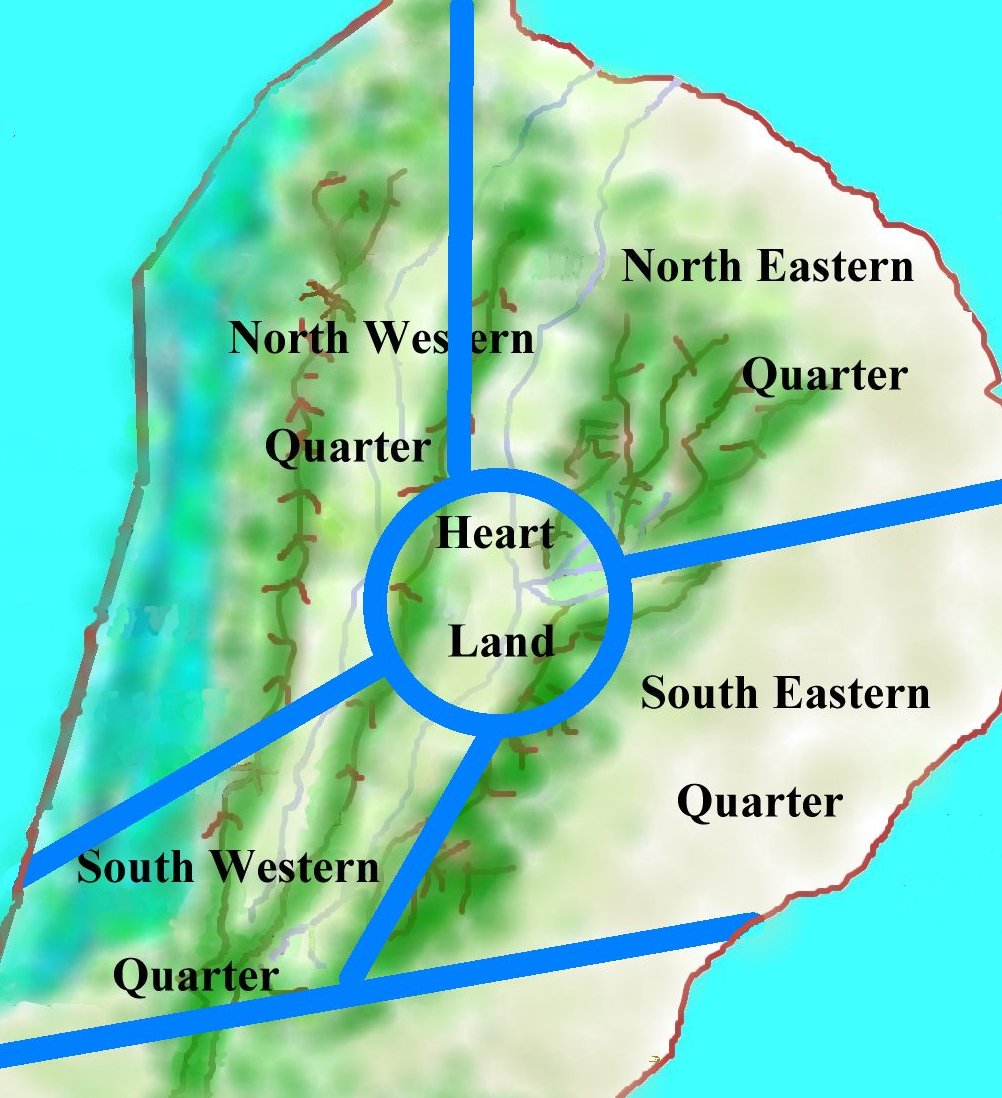 North-Western Quarter:-Consists of the parallel river valley land to the west of the central Sidon River Valley. These land range from Melek on the south to Ammonihah, Noah and Sidom on the north in that river valley. South-Western Quarter:-Consists of the shared highlands where the three mountain ranges came together from Manti of the upper highlands of the Sidon west to the city by the sea. These cities were mostly defensive cities constructed by Moroni and consisted of such as Cumeni, Zeezoram, Antiparah and Judea. Eastern-Southeastern Quarter:-Consisted primarily of the privincial-state lands of Jershon and Antionum before its defection to the Lamanites and perhaps Gideon. The capital city of Jershon is considered to be Aaron. Many defensive cities like Nephihah and Moroni were in the land of Jershon along with others upon the coast going up to Bountiful such as Lehi, Morianton, etc., depending on just where the provincial border was between Bountiful and Jershon. North-Eastern Quater:-Consisted primarily of Bountiful and perhaps some northern capital cities of the lower Sidon River Valley. Again depending on just where the provincial-state border was, it would have included such other defensive cities such as Mulek, Gid, Omner, etc. There were not lands or cities inhabited upon the greater extent of the western coast as that was uninhabitable mangrove swamps all along the western side of the western mountain range down to the sea. The greatest amounts of rainfall are recorded along this pacific shoreline as the weather first hits that raising western range of mountains causing the vast majority of the mositure to first fall there. Centeral Capital Heartland: -Consisted of the provincial-state about the city of Zarahemla in the central Sidon River Valley. Minon, perhaps Gideon, Zarhemla and many unnamed capital cities in the capital parts of the land would have resided there. The following is a suggested consideration of the possible structure of the quarters of the land, though the Book of Mormon does not stipulate such exacting details. |
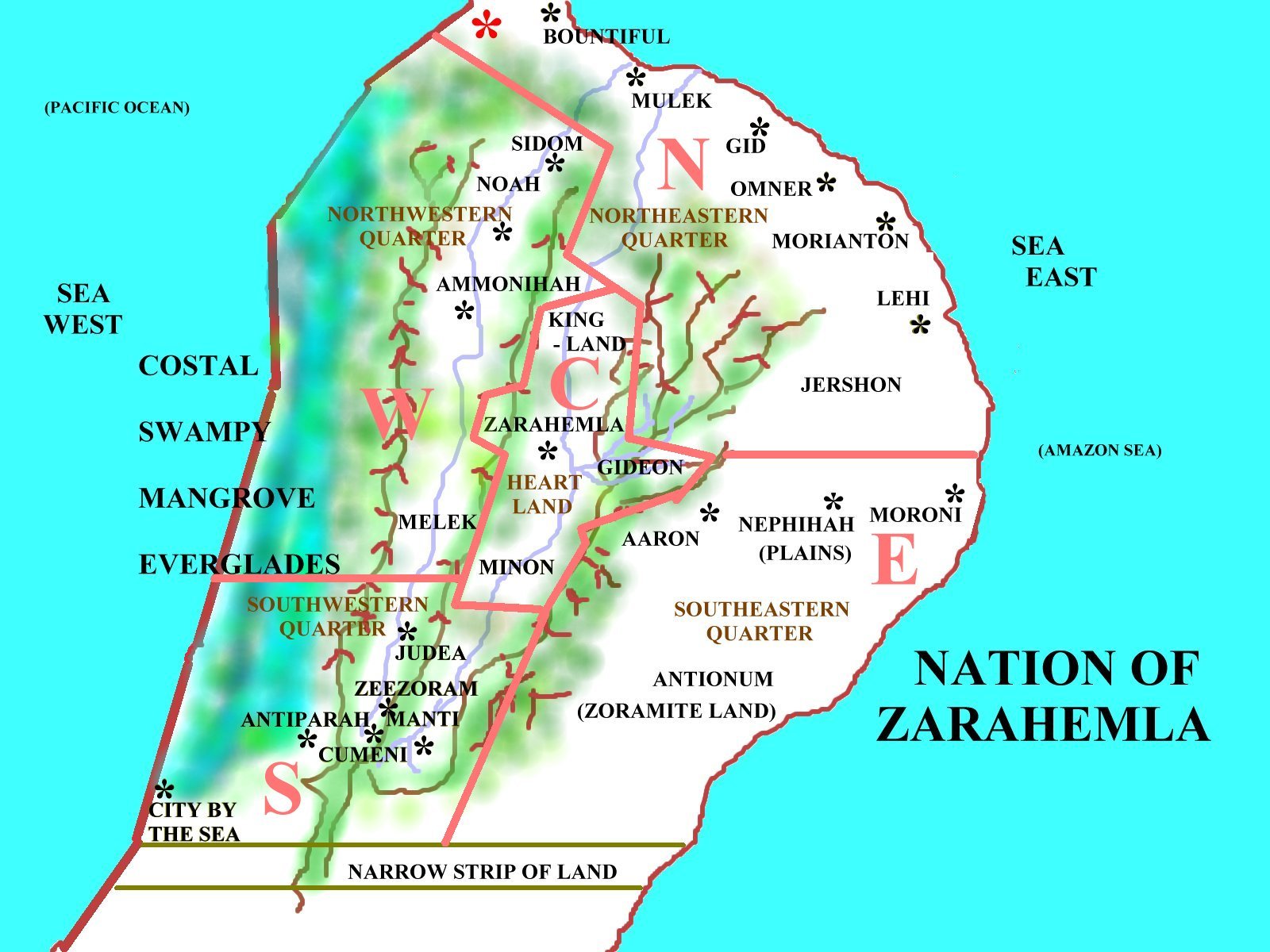 |
||
|
8 Now the sons of Mosiah were numbered among the
aunbelievers; and also one of the sons of Alma was numbered
among them, he being called Alma, after his father; nevertheless, he became a
very wicked and an bidolatrous man. And he was a man of
many words, and did speak much cflattery to the people;
therefore he dled many of the people to do after the manner
of his einiquities.
9 And he became a great hinderment to the prosperity of the church of God; astealing away the hearts of the people; causing much dissension among the people; giving a chance for the enemy of God to exercise his bpower over them.
|
8a
1 Sam. 3:13;
1 Ne. 2:12-13;
Moses 5:16; TG Unbelief, Unbelievers b TG Idolatry c TG Flattery d TG Peer Influence e Mal. 2:8 9a 2 Sam. 12:14 (1-14); 2 Sam. 15:6 (1-6); TG Apostasy of Individuals b D&C 50:7; D&C 93:39 (37, 39)
|
|
|
10 And now it came to pass that while he was going about to
adestroy the church of God, for he did go about
secretly with the sons of Mosiah seeking to destroy the
churcha, and to lead astray the
people of the Lord, contrary to the commandments of God, or even the
king—
11 And as I said unto you, as they were going about arebelling against God, behold, the bangel of the Lord cappeared unto them; and he descended as it were in a dcloud; and he spake as it were with a voice of thunder, which caused the earth to shake upon which they stood; 12 And so great was their astonishment, that they fell to the earth, and understood not the words which he spake unto them.
|
10a he did go about secretly with the
sons of Mosiah seeking to destroy the church Now the degree of
'secrecy' seems more to be as a matter of abiding within definitions of the
law rather than hiding the fact from the king and Alma senior, the head of
the church. For Alma the elder did know that which his son was about and was
praying that there would be an intervention in it. Therefore Alma the younger
and the sons of Mosiah likely were going about their business of destorying
the church in a manner which could not be proven at law against them. And this
would be that 'secretness' within which they did operate that the law could
have no hold upon them, insuring that none could come forth to testify against
them though it might well be public understanding that this is what they were
about, but not to be testified against by law. This would infer cunning and
craftiness in their endeavors, being wolves in a type of sheep clothing that
the laws could have no crasp upon them.
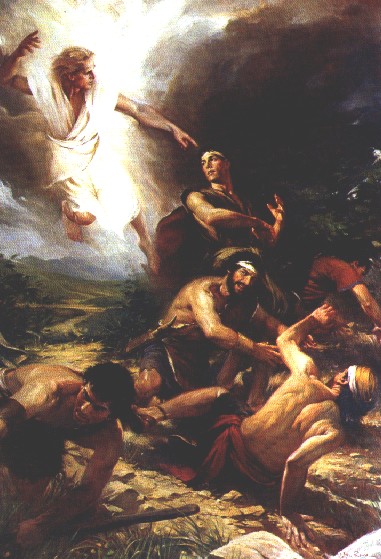 |
10a
Acts 8:3;
Mosiah 28:4 (3-4) 11a TG Disobedience; TG Rebellion b Alma 21:5 c Acts 9:3 (1-9); Mosiah 27:15; Alma 8:15; Alma 17:2 d Ex. 19:9, 16
|
|
13 Nevertheless he cried again, saying: Alma, arise and stand forth,
for why persecutest thou the church of God? For the Lord hath said:
aThis is my church, and I will establish it; and nothing
shall boverthrow it, save it is the transgression of my
people.
14 And again, the angel said: Behold, the Lord hath aheard the prayers of his people, and also the bprayers of his servant, Alma, who is thy father; for he has cprayed with much faith concerning thee that thou mightest be brought to the dknowledge of the truth; therefore, for this purpose have I come to econvince thee of the power and authority of God, that the fprayers of his servants might be answered according to their faith. 15 And now behold, can ye dispute the power of God? For behold, doth not my voice shake the earth? And can ye not also abehold me before you? And I am sent from God.
|
13a
Mosiah 26:22; TG Jesus Christ, Head of the Church b Hosea 13:9; TG Apostasy of Individuals 14a Dan. 10:12; Abr. 1:16 (15-16) b 2 Cor. 1:11; Alma 10:22 c TG Family, Love within d Hosea 4:6 e Alma 29:10 f Alma 19:17; Morm. 9:36-37 15a Mosiah 27:11
|
|
|
16 Now I say unto thee: Go, and remember the captivity of thy fathers
in the land of aHelam, and in the land of Nephi; and
remember how great things he has done for them; for they were in
bbondage, and he has cdelivered them. And
now I say unto thee, Alma, go thy way, and seek to destroy the church no
more, that their prayers may be answered, and this even if thou wilt
of dthyself be ecast
offa.
17 And now it came to pass that these were the last words which the angel spake unto Alma, and he departed.
|
16a this even if thou wilt of thyself be cast off The angel had commanded Alma to stop seeking to destory the church of God. The angel did not command or force Alma to repent. In fact the angel here states that even if it was Alma's own free will for himself to be cast off, that he was to stop seeking to destory the church. That is he could choose for himself to be cast off, but he was not to continue to destory the church of God. In fact Alma was told to 'go thy way', meaning to go and do as he would, but not to seek to destroy the church. Alma could have remained a sinner, but he would not be allowed to continue to destory the Church. This may have an application with those who persecute the church today, that is we ought to pray that their persecutions cease against us. We are not to just accept them as being so 'ordained' to come. We do have a power of prayer and the requesting of God to remove them. to put an end to them. Now therefore, it was Alma's own reaction and pleadings to the Lord by which his repentance did come. It did not come by way of the command of the Lord, of the angel of the Lord. This would have been the similar case with Saul or Paul. He would have been told to no longer persecute the Christians, but it would have been Saul's own iniative to then further himself by repentance and eventually be called as an apostle. |
16a
Mosiah 23:19;
Alma 24:1 b Mosiah 25:10; Alma 5:5-6 c Mosiah 23:1-4 d Alma 30:47 e Micah 3:6 (1-7); Matt. 8:12 (11-12)
|
|
18 And now Alma and those that were with him fell again to the earth,
for great was their astonishment; for with their own eyes they had beheld an
aangel of the Lord; and his voice was as thunder, which
bshook the earth; and they knew that there was nothing save
the power of God that could shake the earth and cause it to tremble as though
it would part asunder.
19 And now the astonishment of Alma was so great that he became adumb, that he could not open his mouth; yea, and he became weak, even that he could not move his hands; therefore he was taken by those that were with him, and carried helpless, even until he was laid before his father. 20 And they rehearsed unto his father all that had happened unto them; and his father rejoiced, for he knew that it was the power of God.
|
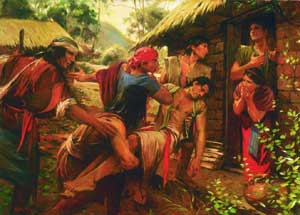 |
18a
TG
Angels b Isa. 6:4; Alma 36:7 19a Dan. 10:15; Luke 1:20-22
|
|
21 And he caused that a multitude should be gathered together
that they might witness what the Lord had done for his son, and
also for those that were with him.
22 And he caused that the priests should assemble themselves together; and they began to fast, and to pray to the Lord their God that he would open the mouth of Alma, that he might speak, and also that his limbs might receive their strength—that the eyes of the people might be opened to see and know of the goodness and glory of God.
|
|
|
|
23 And it came to pass after they had fasted and prayed for the space
of atwo days and two nights, the limbs of Alma received
their strength, and he stood up and began to speak unto them, bidding them to
be of good comfort:
24 For, said he, I have repented of my sins, and have been aredeemed of the Lord; behold I am born of the Spirit.
|
23a
Alma 36:10 24a Ps. 49:15; Alma 27:25; A of F 3
|
|
|
25 And the Lord said unto me: Marvel not that all mankind, yea, men
and women, all nations, kindreds, tongues and people, must be
aborn again; yea, bborn of God,
cchanged from their carnal and dfallen
state, to a state of righteousness, being redeemed of God, becoming his
esons and daughters;
26 And thus they become new creatures; and unless they do this, they can in anowise inherit the kingdom of God. 27 I say unto you, unless this be the case, they must be cast off; and this I know, because I was like to be cast off.
|
25a
Rom. 6:3-11;
TG
Conversion; TG Man, New, Spiritually Reborn b Mosiah 5:7; Alma 5:14, 49 c Moses 6:65 d TG Man, Natural, Not Spiritually Reborn e Mosiah 15:10; Moro. 7:19 26a John 3:5
|
|
|
28 Nevertheless, after awading through much
btribulations, repenting nigh unto death, the Lord in mercy
hath seen fit to snatch me out of an ceverlasting burning,
and I am born of God.
29 My soul hath been aredeemed from the gall of bitterness and bbonds of iniquity. I was in the darkest abyss; but now I behold the marvelous light of God. My soul was cracked with eternal torment; but I am snatched, and my soul is dpained no more.
|
28a
1 Kings 18:21 b TG Tribulation c 2 Ne. 9:16 29a Isa. 38:17 b Isa. 58:6 c Mosiah 2:38 d TG Pain
|
|
|
30 I rejected my Redeemer, and denied that which had been spoken of
by our fathers; but now that they may foresee that he will come, and that he
remembereth every creature of his creating, he will make himself manifest
unto aall.
31 Yea, aevery knee shall bow, and every tongue confess before him. Yea, even at the last day, when all men shall stand to be bjudged of him, then shall they confess that he is cGod; then shall they confess, who live dwithout God in the world, that the judgment of an everlasting punishment is just upon them; and they shall quake, and tremble, and shrink beneath the glance of his eall-searching eye.
|
30a
D&C 84:45 (45-46) 31a Philip. 2:10 (9-11); Mosiah 16:1-2; D&C 88:104; D&C 138:23 b TG Jesus Christ, Judge c Mosiah 7:27; Alma 11:39 (38-39) d Eph. 2:12; Mosiah 41:11 e TG God, Omniscience of
|
|
|
32 And now it came to pass that Alma began from this time
forward to teach the people, and those who were with Alma at the
time the angel appeared unto them, traveling round about through
all the land, publishing to all the people the things which they
had heard and seen, and preaching the word of God in much
tribulation, being greatly persecuted by those who were
unbelievers, being smitten by many of them.
33 But notwithstanding all this, they did impart much consolation to the church, confirming their faith, and exhorting them with long-suffering and much travail to keep the commandments of God.
|
|
|
|
34 And four of them were the asons of Mosiah; and
their names were Ammon, and Aaron, and Omner, and Himni; these were the names
of the sons of Mosiah.
35 And they traveled throughout all the lands of Zarahemla, and among all the apeople who were under the reign of king Mosiah, bzealously striving to repair all the injuries which they had done to the church, cconfessing all their sins, and publishing all the things which they had seen, and explaining the prophecies and the scriptures to all who desired to hear them.
|
34a
Mosiah 28:1;
Mosiah 29:3;
Alma 17:1 35a Mosiah 1:10; Mosiah 28:18 b TG Zeal c Alma 39:13
|
|
|
36 And thus they were instruments in the hands of God in
bringing many to the knowledge of the truth, yea, to the
knowledge of their Redeemer.
37 And how blessed are they! For they did apublish bpeace; they did publish good tidings of gooda; and they did declare unto the people that the Lord reigneth.
|
37a they did publish peace; the did publish good tidings of good This is that ministry of delivering the word of God according to that which Abinadi did speak (see Mosiah 12:20-24, Isaiah 52:7-10 and Mosiah 15:11-19), of the beautiful feet upon the mountains are of they who publish peach and good tidings. This is the manner of the servants of the Lord from the least unto the greatest, from the simplest parent and example of the humble follower even unto the prophet and even the Lord Jesus Christ himself. For they do minister in the word of God unto the people unto the conviencing of them of the things of God. |
37a
Mosiah 12:21;
Mosiah 15:14-17 b TG Peace of God
|
| This BM Book | Previous BM Chapter | Next BM Chapter | Commentary Page | Home Page |